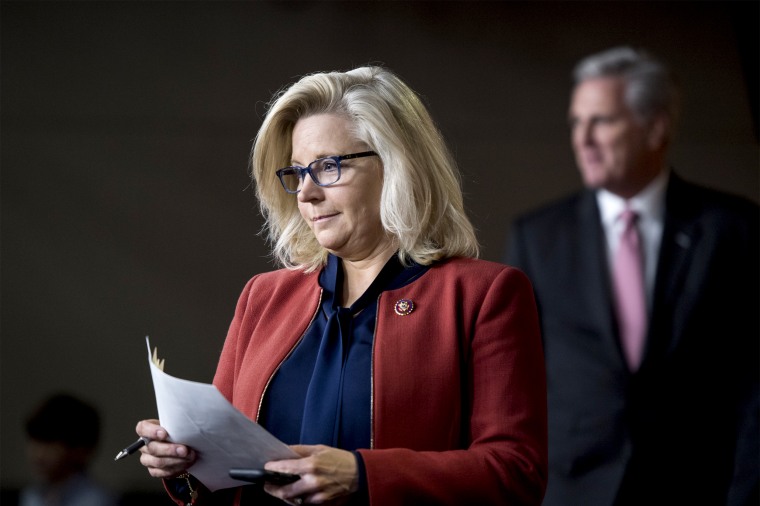Yesterday morning, Donald Trump issued a brief written statement, declaring, "The Fraudulent Presidential Election of 2020 will be, from this day forth, known as THE BIG LIE!" It wasn't long before a prominent member of the House Republican leadership pushed back publicly.
Rep. Liz Cheney of Wyoming, the third-ranking House Republican, said Monday that anyone claiming the 2020 presidential election was stolen is "poisoning our democratic system," a direct response to former President Donald Trump. "The 2020 presidential election was not stolen," Cheney, chair of the House Republican Conference, said in a tweet. "Anyone who claims it was is spreading THE BIG LIE, turning their back on the rule of law, and poisoning our democratic system."
A spokesperson for the congresswoman confirmed to NBC News that the timing of her tweet was not coincidental: Cheney was, in fact, responding directly to the former president's misguided statement.
Soon after, according to a CNN report, the House Republican Conference chair delivered closed-door remarks at a conference in Georgia, telling her audience, "We can't embrace the notion the election is stolen. It's a poison in the bloodstream of our democracy. We can't whitewash what happened on January 6 or perpetuate Trump's big lie. It is a threat to democracy. What he did on January 6 is a line that cannot be crossed."
To be sure, there's nothing altogether surprising about the Wyoming lawmaker's perspective. As we've discussed, after the Capitol riot in January, Republican leaders scrambled to shield Donald Trump from consequences. Cheney went her own way, saying, among other things, that there had "never been a greater betrayal by a president of the United States." She voted for the then-president's impeachment soon after.
A month later, Cheney again took a stand at odds with the GOP line, telling reporters, "I've been clear on my views about President Trump. I don't believe that he should be playing a role in the future of the party or the country."
In March, when Republican leaders were content to ignore Rep. Paul Gosar's (R-Ariz.) white-nationalist ties, Cheney again broke ranks. In April, she again rejected her party's line on the creation of a Jan. 6 independent commission, using rather provocative words such as "appease," "constitutional crisis," and "survival of the country." Last week, she drew rebukes from the right again for daring to give President Joe Biden a fist bump ahead of his national address.
And now, the House Republican conference chair is at it again, telling truths that much of her party doesn't want to hear. In the process, Cheney is inviting consequences that put her career in jeopardy.
Indeed, Rep. Lance Gooden (R-Texas) publicly predicted she'll no longer be the House GOP conference chair by the end of the month -- a sentiment echoed by other Republicans on Capitol Hill. Axios ran a related report last night, adding that GOP lawmakers aren't just "moving closer to ousting" Cheney from her leadership post, they've also begun lining up possible successors.
For now, let's put aside the absurdity of the circumstances -- Cheney would be the first congressional leader ever ousted for simply telling the truth about an election result -- and consider the Wyoming Republican's strategy.
Because at face value, it's clear that Cheney is taking a significant risk. She's no doubt aware of the fact that poking the Trumpian bear could cost Cheney her job, but it's clear that she's prepared to take a stand anyway, whether it infuriates her GOP colleagues or not. The congresswoman obviously sees value in telling an important truth.
But why invite an intra-party backlash? Though it seems implausible, one possibility is that Cheney has quietly received far more support from House Republicans than is obvious from a distance. Let's not forget that plenty of far-right members thought they had a shot at ousting her from her leadership post in February, when Cheney invited a caucus vote to resolve any questions about her standing, but she prevailed with about 70% support.
It raises the prospect of some GOP members pretending to be outraged by Cheney's apostasy, right up until it's time to cast secret ballots, at which point they quietly vote in the opposite direction.
But it's more likely that the House Republican Conference chair is making a calculated bet: there's no such thing as being kinda sorta anti-Trump in contemporary GOP politics. One is either a sycophantic toady or they're a principled critic, and since the former president has already deemed the Wyoming congresswoman an enemy to be destroyed, Cheney appears to have decided that speaking her mind, endorsing democracy, and telling the truth is a posture worth leaning into.
Sure, she could express regrets, and grovel to Trump by pretending the Big Lie is real, but at this point, the former president and his allies wouldn't support her anyway. Cheney can't unring the bell, but she seems eager to earn the support of those who'll respect her for ringing it in the first place.
The House GOP conference is scheduled to meet again a week from tomorrow. Watch this space.

